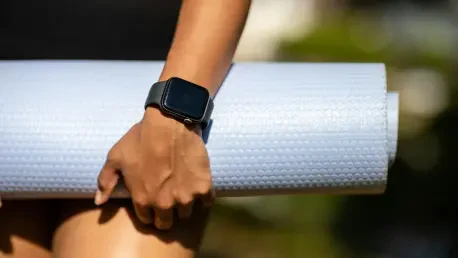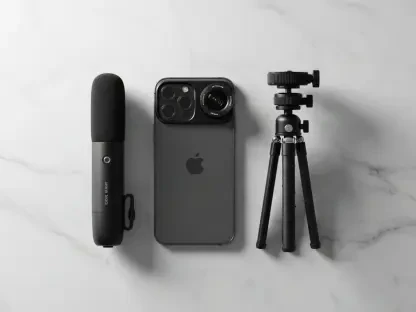The rise of wearable health technology in the United States has sparked a significant conversation about its potential to transform public health outcomes. With U.S. Health and Human Services Secretary Robert F. Kennedy Jr. advocating for the widespread use of health trackers, there is an active push toward encouraging Americans to take a more proactive role in managing their health. These devices, ranging from smartwatches and fitness trackers to continuous glucose monitors, promise an era where technology plays a crucial role in daily wellness practices. As the country grapples with rising healthcare costs and lifestyle-linked health issues, the introduction of these digital companions could be a game-changer, but the road ahead is lined with uncertainties and challenges.
The Vision: Enhancing Public Health and Empowering Individuals
A Broader Perspective on Health Empowerment
Robert F. Kennedy Jr.’s initiative revolves around a simple yet profound concept: empowering individuals to take charge of their health. By wearing health trackers, individuals can gain continuous insights into vital health metrics such as heart rate, physical activity, and glucose levels. This real-time data can act as a catalyst for informed decisions about diet, exercise, and lifestyle choices, fostering a culture of personal responsibility towards health management. Such empowerment could potentially reduce the burden on healthcare systems by emphasizing prevention over treatment. Kennedy envisions rolling out one of the most extensive advertising campaigns in the history of the Health and Human Services Department to promote this initiative, stressing that these technologies can lead to a healthier nation, one data point at a time.
The Vision for a Healthier Nation
The larger mission behind the push for wearable health technology is encapsulated in Kennedy’s slogan to “Make America Healthy Again.” At its core, this vision is about reclaiming autonomy over personal health and leveraging technology to bridge the gap between awareness and action. With over 41% of Americans already owning wearable devices, there is an apparent trend toward adopting technology-driven health solutions. The promise of these technologies lies in their ability to personalize health tracking, providing insights tailored to individual health needs. However, translating this vision into reality involves tackling fundamental challenges related to adoption, cost, and societal readiness to embrace a technology-driven health paradigm. Success in this endeavor would mean a shift from passive healthcare consumption to active health participation, marking a transformative era in public health.
Navigating the Challenges: Financial, Privacy, and Ethical Concerns
Financial Barriers and Cost Implications
Despite the potential benefits, a major hurdle in the widespread adoption of wearable health technology remains the cost. Devices such as continuous glucose monitors are known for their hefty price tags, ranging from $100 to $300 monthly. This brings up critical questions about funding and affordability, crucial for a nationwide rollout. There is still uncertainty over whether the government will subsidize these devices or if this financial burden will fall on individual citizens. The cost concern is not just restricted to the devices themselves but extends to the infrastructure required for data management and analysis. Addressing these financial barriers is essential to prevent exacerbating health disparities by ensuring that these health tools are accessible to all, not just those who can afford them.
Privacy and Security Issues
Another significant challenge is the protection of data generated by these wearable devices. Unlike data that falls under the Health Insurance Portability and Accountability Act (HIPAA), information collected by wearables is primarily governed by the companies’ terms of service. This introduces potential loopholes allowing data sharing or sales, raising concerns about personal privacy. The increasing value of health data makes it a prime target for hackers, further emphasizing the need for robust security measures. Beyond unauthorized access, the prospect of health data being commercialized without user consent is ethically contentious. Health tracker data management requires a comprehensive framework to protect individuals’ rights to privacy and secure the data from misuse, which could undermine trust in these technologies.
Ethical Dilemmas and Social Considerations
Addressing Ethical and Interpersonal Issues
Widespread use of wearable health technologies also prompts ethical considerations. Concerns about how data could be managed and possibly sold without user consent are paramount. The ethical implications of storing and potentially commercializing personal health information in cloud services demand scrutiny and transparency. There are also interpersonal dynamics at play; as wearables become more common, social pressures to participate in data-sharing ecosystems could rise. This raises the question of personal autonomy versus technological advancement, a tension that must be addressed ethically and sensitively to avoid infringing on individual rights or creating societal divides.
Confronting Nepotism and Motivation Issues
Lastly, the potential conflicts of interest, such as Kennedy’s relationship with advisors having ties to companies promoting health tech, underscore the need for transparency. Trust in this initiative could be compromised if perceived as advancing commercial interests over public good. Additionally, the effectiveness of wearables in achieving health goals relies heavily on user motivation and ability to interpret data correctly. Not everyone is technologically adept or willing to engage with constant data feedback. Without adequate support and education, the risk of misinterpreting data leading to medical anxiety or incorrect self-diagnoses is increased. This highlights the importance of ensuring these technologies are genuinely beneficial and accessible to users from all backgrounds, with a focus on education and support.
Overcoming Adoption Hurdles through Strategic Development
Technological Barriers and Interoperability Challenges
The complexities don’t just end with cost and ethics; there is also a technological dimension to consider. Wearables often operate within proprietary ecosystems, limiting their ability to share and utilize data across platforms. This lack of interoperability can stifle the effectiveness of health data exchange and integration, a vital component for building a cohesive health tracking system. Ensuring compatibility and seamless data integration across diverse platforms is necessary for maximizing the benefits of these technologies in the overall healthcare landscape. Innovating toward open standards for health data can potentially solve these interoperability challenges, enhancing the collective utility of wearable devices.
Building User Motivation and Overcoming Mental Health Concerns
Finally, the human factor comes into play. The success of wearables in improving health outcomes significantly depends on user engagement and willingness to adapt to new technology. Many potential users may feel overwhelmed by the vast amount of data, leading to hesitation or misuse of information. Further, continuous monitoring could contribute to medical anxiety, where individuals may develop undue stress over normal variations in health metrics. To address these concerns, companies and policymakers must focus on creating user-friendly interfaces, educational resources, and support systems that empower users to make informed and balanced decisions. Encouraging healthier habits through positive reinforcement, rather than fear or anxiety, could significantly enhance the overall value proposition of wearable health technology.
Moving Forward: A Path to Potential Success
The surge in wearable health technology in the United States has ignited a noteworthy discussion regarding its potential to revolutionize public health. With Robert F. Kennedy Jr., the U.S. Health and Human Services Secretary, advocating for the broad adoption of health trackers, there is a concerted effort to motivate Americans to take a more active role in managing their well-being. These gadgets, ranging from smartwatches and fitness trackers to continuous glucose monitors, herald a new era where devices heavily influence daily health maintenance. As the nation faces growing healthcare costs and lifestyle-related health challenges, these digital tools could be pivotal. However, their implementation is fraught with uncertainties and obstacles. Privacy concerns, data accuracy, and technological disparities pose significant hurdles. Nevertheless, the promising potential of these technologies to improve individual and public health remains significant, offering a glimpse into a future where personal health management is more accessible and efficient.









